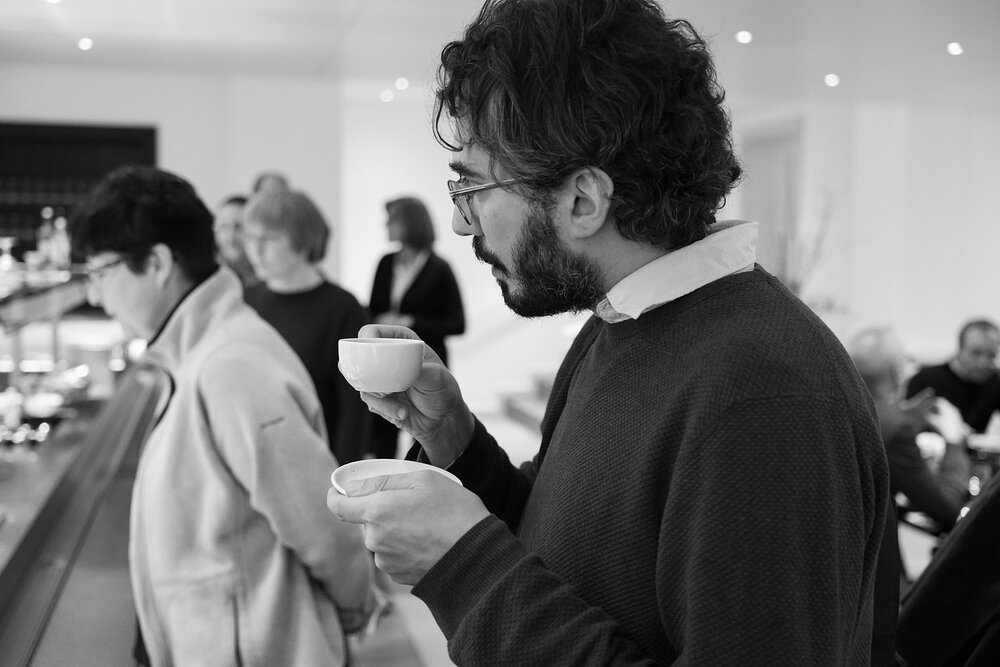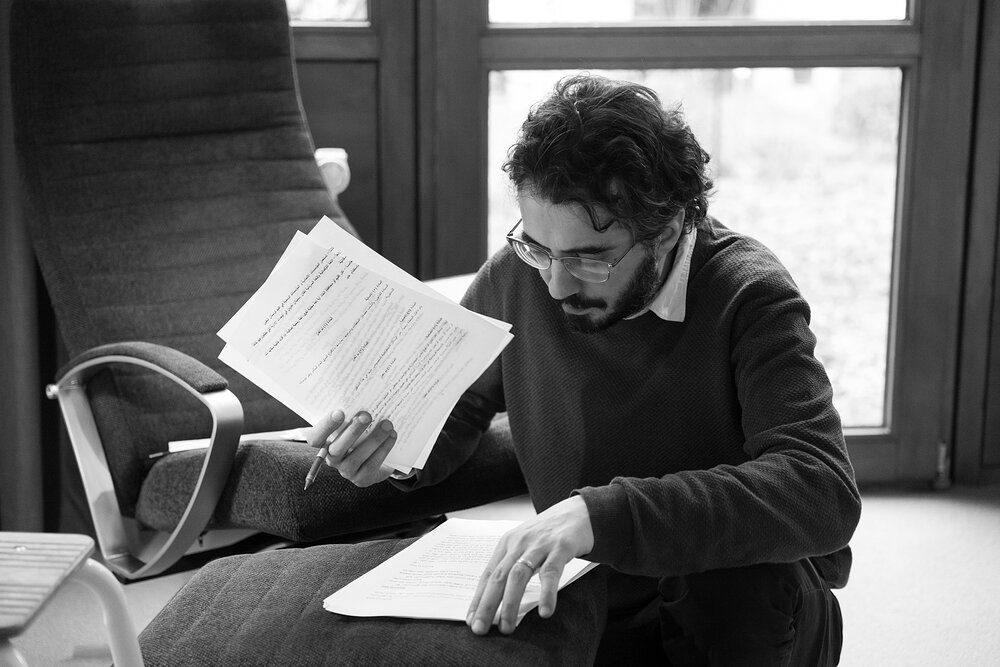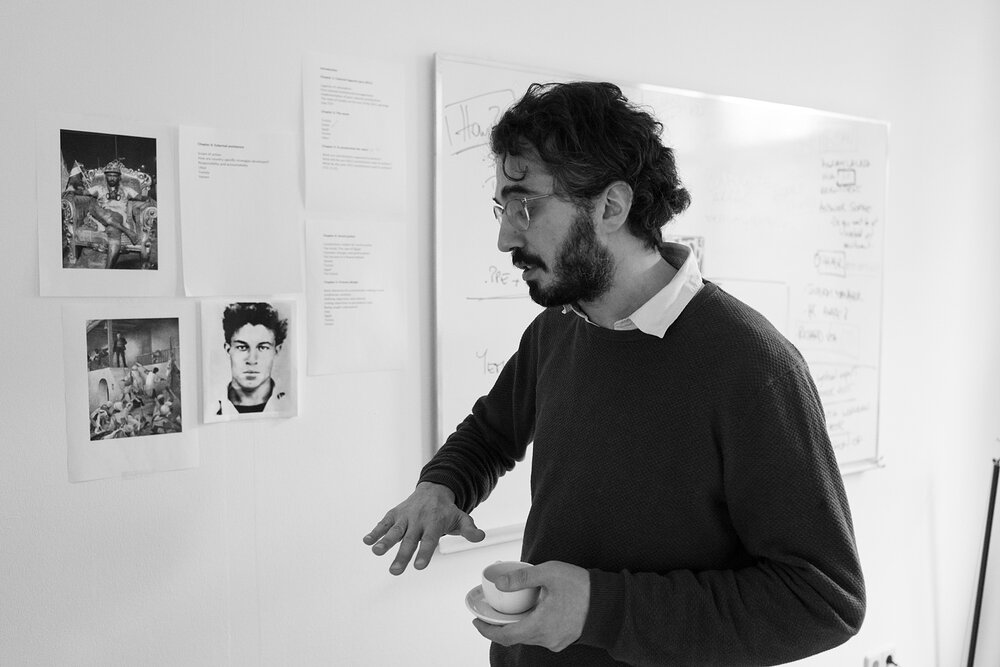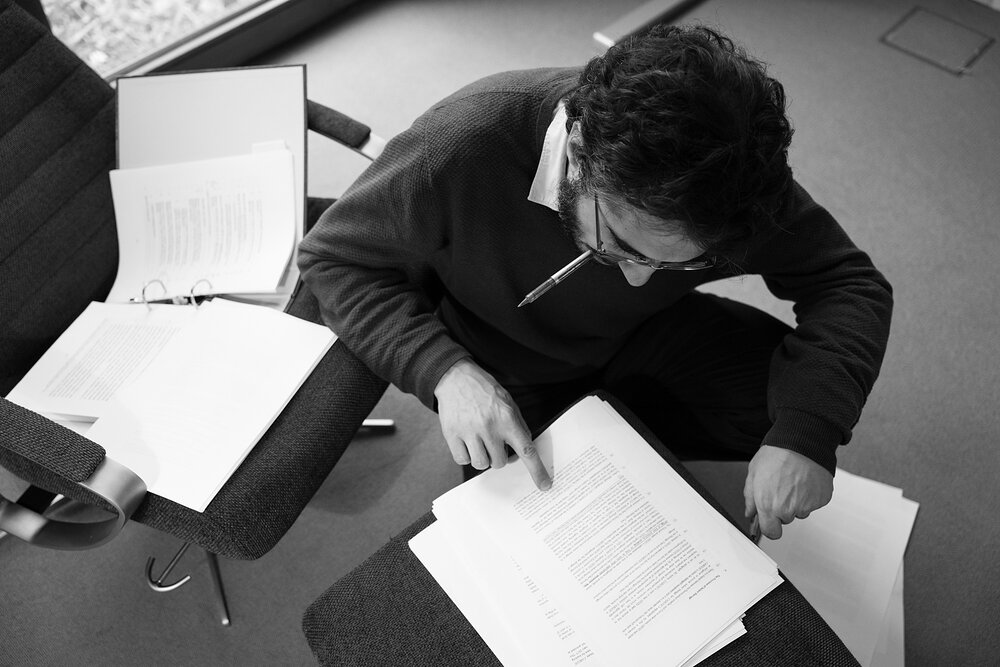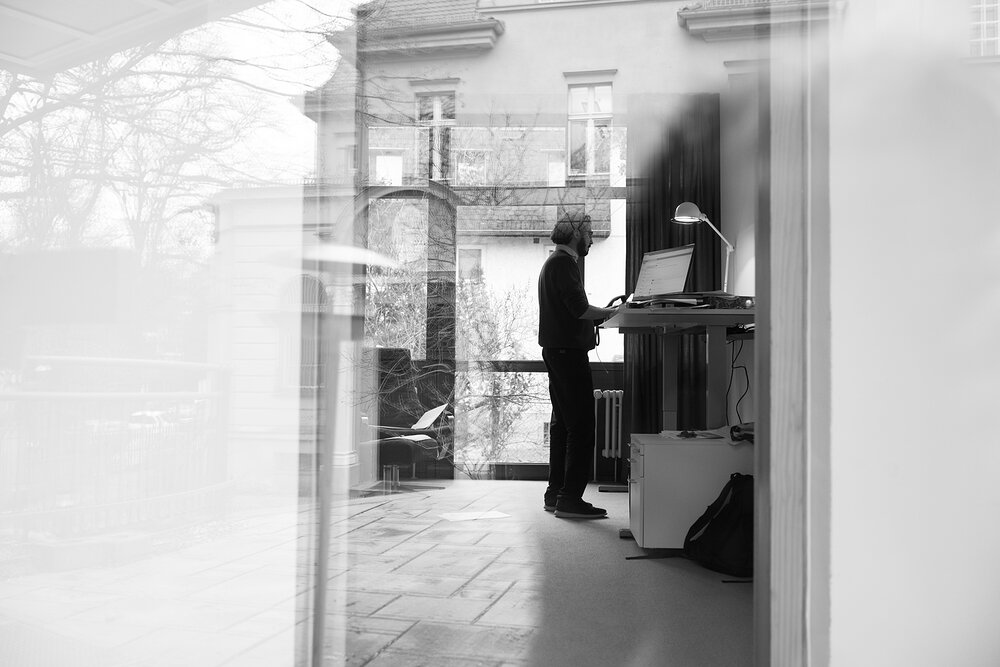Issue 15 / May 2020
"Every conversation offers a chance"
Katja Gelinsky
An attitude of sober optimism would best describe the prevailing mood of Zaid Al-Ali. The constitutional law expert has been observing political developments in the countries of the Middle East for years and sheds light on the individual situation of each nation in the crisis region
Katja Gelinsky: Starting in 2011 the Arab protest movement initiated processes of constitutional reform in almost a dozen countries in the region. As a consultant for constitutional law you have provided assistance to the drafting of new or modified constitutions in almost all of these states. How did this come about?
Zaid Al-Ali: Perhaps I should start at the very beginning. My family comes from Iraq, but I was born in Madrid and as a child I lived in a variety of countries. From the very start my legal work was strongly informed by my international experience. I worked for an international law firm in Paris, London and New York. In 2005 I started work as a legal adviser to the United Nations in Iraq where a new constitution was being created after the fall of Saddam Hussein. During that time, I published a significant amount of material on constitutional law in Iraq and made many useful contacts. In 2011 when the “Arab Spring” began I was approached from various quarters and asked whether I could support those Arab countries which sought to undertake constitutional changes in the wake of the protests. I finally decided to work for the International Institute for Democracy and Electoral Assistance (IDEA), an intergovernmental organization to promote democracy which is headquartered in Stockholm. For IDEA I moved to Cairo where there was a national debate on how the Egyptian constitution should be amended. I also visited Tunisia on a large number of occasions where I met with officials and others who were negotiating with the Tunisian constitution at the time. To summarize, I developed a network which gradually encompassed more and more Arab countries, through my publications, consultations, media appearances and personal contacts.
KG: Constitutional reforms are a politically sensitive matter, especially when they are predicated on uprisings. I suppose it wasn’t easy for you to gain access to the negotiations?
ZAA: That varied widely from country to country. Traditionally the ruling powers in Egypt are very mistrustful of foreigners. And I certainly felt that. As a non-Egyptian I wasn’t permitted to be directly involved in the constitutional consultations. In fact, I wasn’t even allowed to be in the room when the negotiations were happening. Instead I held background discussions with many of the negotiators. In other countries, I could sit at the negotiating table. That was particularly true in Yemen. Overall my encounters were very varied. I advised government representatives, officials who worked up the constitutional texts, representatives of the various political parties, but also figures from civil society and journalists.
KG: In the Arab Spring countries, what expectations did the population have of the constitutional reforms?
ZAA: In general one can say that the relationship between state and citizen was at the forefront. Of central importance to the population was a defense of fundamental rights and first and foremost the right to dignity. Added to that, in many Arab countries socio-economic rights play an important role in people’s constitutional understanding. What they expect from the state is that it should provide adequate health care and education and relatively good employment opportunities.
KG: Just how important were democratic issues?
ZAA: That’s not easy to say. Not all those who protested against their rulers had taken to the streets simply because they were ardent proponents of democracy. For many people in Arab countries, democracy is primarily an instrument in the battle against corruption and nepotism. They associate democracy with a hope for improving their own socio-economic lot. Others are of the view that democracy is a value in and of itself while others still consider that democracy should basically be rejected.
KG: And what role did the protection of minorities play in the constitutional negotiations?
ZAA: Minority rights are an issue primarily in those countries where relatively large groupings of religious minorities live, for instance in Iraq and Lebanon or Egypt. On the other hand, Tunisia is very homogenous so minority rights are not as important an issue. Religious communities in Iraq and Lebanon enjoy their own political rights – in contrast to Egypt where the constitution has very little to say about the rights of the Christian minority. Theoretically, Egypt somewhat follows the French state model by making no distinction between a Christian and a Muslim citizen. In civil law, though, for instance in family law or hereditary rights, there are indeed completely different laws for the various religious groupings.
KG: Seeing as how we’ve now broached the topic of religion and law, what was the importance of Shariah – which forms the foundation of Islamic commandments and prohibitions – in drafting the various constitutions?
ZAA: Shariah, democracy and the constitutional state form an intricate complex in almost all those countries involved in the Arab Spring. The populace had taken to the streets because they saw no future for themselves. But even though they didn’t lead the protests and didn’t support the populace, Islamist organizations profited most from the uprisings in a political sense because the Islamist actors were the best organized. They wanted to take advantage of the opportunity to make Shariah the basis of the legal system. This led to considerable friction. In the 2011 elections in Tunisia the Islamist party gained some 40 percent of the vote, but none of the other parties – who were themselves not united – were in favor of establishing an Islamic state. In Egypt, Shariah was already part of positive law, but the Muslim Brotherhood and its allies had a political majority and were in favor of strengthening the influence of Shariah in the constitution. With the fall of the Muslim Brotherhood the Egyptian military rolled back the changes that had been made by the Brotherhood, and brought the influence of Shariah back to what it was on the eve of the uprising. On the whole one can say that after the Arab Spring the attempts to make Shariah the basis of Arab constitutions have for the moment failed. But this doesn’t mean that the Shariah battle is over. We’ll simply have to wait and see how things develop.
KG: Even if the advocates of Shariah didn’t achieve their objectives, you are pointing out that it was ultimately the elites who enacted constitutional reforms that satisfied their interests and thus largely ignored the needs of the populace. How was that possible after the constitutionalization processes had been set in motion through the popular protests?
ZAA: There were a number of reasons. Constitutional negotiations, by their very nature, are elite projects in which the general population has very little scope to be directly involved. Added to this is the fear of change, which is especially pronounced in conservative Arab societies. People were and are dissatisfied, but they balk at the uncertainty of something new. We also should not forget that the Arab Spring was a spontaneous event. There were no plans in place as to what should follow the uprisings. In addition, protesters did not have any organizational structures that they could build on, given that it was impossible to organize properly under the repressive governments that were in power prior to the uprisings. That’s why it is so important that the groundwork be prepared while we conduct talks and hold other discussions. That’s essentially what I’m doing these days – supporting people in the region in their effort to develop their own ideas of what they wish to achieve if another opportunity for reform emerges.
KG: Where do you see the best chances for a positive development?
ZAA: Most observers tend to think that Tunisia is the most likely place where there will be positive developments. The conditions are good because they have no violent conflicts there like in Libya, Yemen or Iraq. Plus Tunisia, after the uprisings, changed its political system from the ground up and created democratic structures. The executive leadership was also replaced. By contrast in Egypt a great deal has remained the same. Political power is still concentrated in the office of the president, the parliament has little influence and the courts are largely under governmental control. In Egypt the reactionary Islamic powers are also much stronger than in Tunisia where there is clearly a broader political spectrum, which made it much easier to achieve rapprochement and compromise in Tunisia. This has also had a positive impact on reform of the judicial system. I see really great progress primarily in the fact that Tunisia is the first country in the region that has grounded the principle of proportionality in its constitution. The model for this, incidentally, was German jurisprudence.
KG: In countries like Libya and Yemen there were also plans for new constitutions. Today there are violent power struggles in both countries. Are these a result of failed constitutional negotiations or are the constitutional reforms a victim of the violence?
ZAA: The two interacted with one another. In both countries the violent conflicts had already begun before the constitutional plans failed. But the failure then set off a renewed spate of violence. I participated in the constitutional negotiations as an advisor in Yemen in 2014. During this process the Houthi rebels conquered increasingly more territory. When they toppled the government in 2015 they declared that the constitutional reform process that was ongoing was over. That shouldn’t come as a surprise because the Houthis weren’t taken into consideration. By contrast in Libya the constitutional work was in the hands of elected representatives of the people. But that was likewise problematic because members of political parties were forbidden to stand for election. The reason for this was the distrust of political parties, which was a legacy of Gaddafi’s dictatorship. But the members of the constitutional committee didn’t have the backing of those who exercised power and influence in Libya. The negotiations proceeded completely disconnected from the fact that militia leaders controlled large parts of the country. That couldn’t work. Why should the militia leaders accept the constitutional plans of a powerless committee?
KG: In both Yemen and Libya the United Nations supported the efforts at reform. What do the negative developments in both countries say about the role and influence of international advisers in processes of constitutionalization in the Arab region of the world?
ZAA: I wouldn’t generalize by speaking of a failure of the United Nations. Civil war was already threatening in Yemen as early as 2011. At the time, the prevailing opinion as to why it never actually broke out is that it was due to the efforts of the United Nations, namely Jamal Benomar, the UN special envoy in Yemen at the time. He was initially so beloved that Yemenite parents named their children after him. In the years 2014 and 2015, by contrast, Benomar was no longer able to prevent civil war from breaking out. If one of the parties to the conflict is unwilling to negotiate, even the United Nations is powerless. Nevertheless the special envoy is a key figure because he determines the strategy of the United Nations in its efforts to resolve conflict. In 2011 to 2012, the special envoy for Libya was Ian Martin, who is from the United Kingdom. He acted with great restraint after the Arab uprising. In 2012, after Gaddafi’s fall from power, the United Nations gave technical but not political support to preparations for the first election so as to afford the Libyans sufficient scope to forge their own path to a democratic configuration. As I said, to a very large extent the UN special envoy determines how the United Nations should proceed in a given country. That’s remarkable when you think about how serious the consequences of misguided assistance can be not only for a certain country but for an entire region. This is even more problematic when you look at just how someone becomes a UN special envoy. There is no public selection process to find the best candidate, instead the UN Secretary-General simply names a person who might presently be available for the task. Sometimes this will be a person with wide international experience but who can neither speak that country’s language nor knows the region very well.
KG: After upheavals like the Arab uprisings, what can foreign advisers do in a best-case scenario?
ZAA: They can help in developing new perspectives. The more ideas which flow into the reform process the better. Naturally it depends on how a certain adviser understands his or her assigned task. I have had the experience of foreign experts being extremely well prepared and acting with great sensitivity in negotiations. But occasionally there are foreigners who obviously have no idea what they are doing while still seeking to give instruction to a country’s reformers. For example, in Yemen there was a certain person who didn’t even take the trouble to read the draft constitution before the start of consultations.
KG: What should foreign advisers take to heart when they are commissioned with assisting in the constitutional renewal process in Arab countries?
ZAA: I would advise them not to travel to the country with a baggage of preconceived notions. First of all you should ask your dialogue partners on the ground just what their own notions and needs are. Ideally foreign advisers should commit themselves to a long term engagement, and should meet with nationals who are engaged in their constitutional processes some ten or twenty times. At some point it will then be possible for you to tender useful recommendations for action. But in the beginning, as a foreigner, you are completely clueless. That’s why it would be very amiss to press ahead with suggestions at the very first meeting. Many foreign advisers also underestimate just how much constitutional expertise there is in Arab countries, for example with regard to governmental organization, parliamentarianism or judicial control.
KG: Apropos, what has been the actual impact of the Arab Spring on the respective legal systems?
ZAA: On that subject I have to give a longer answer. The judiciary in the region was a component of the repressive regimes. Dictators don’t care for clever judges who are independent thinkers. So there were no incentives for capable young people to choose the career of a judge, especially since the study of law amounted to nothing more than a monotonous cramming for exams. Analysis and critical scrutiny weren’t a part of it – and weren’t required in later judicial training. So over the decades the Arab judicial culture had developed a profound mistrust for everything which threw the system of government into question or was suspect of contravening its rules. Judges understood their role as guardians of the state order. Despite the uprisings, these conservative structures have been largely retained. In their constitutional consultations, well-meaning experts from abroad pointed out how important it was to ensure the judiciary’s independence. But the problem was that there existed no culture of judicial independence. By creating institutional provisions to protect the judiciary from outside influence, this one-sided judicial partisanship in favor of the rulers was bolstered. Despite a fundamental reconstruction of the judicial system, even in Tunisia strong forces of inertia have remained in place. Some Tunisian judges simply ignore the fact that henceforth they are constitutionally obliged to protect the rights of individuals and apply the principle of proportionality. One of the great challenges for Arab countries thus consists of redefining the judiciary’s role. In order to do this, however, the population must first become aware that the injustice and disadvantages which they experience in their countries are also related to the fact that the judges do not administer justice in the name of the people. What is required, therefore, is a change in attitude. Also necessary is a renewal of personnel in the judiciary as well as structural reforms to hinder the abuse of judicial independence and to penalize misconduct. It’s no use simply reforming the constitutions. What’s needed is to transform judicial culture without which constitutional reforms will remain ineffective.
KG: Even though the constitutionalization processes after the Arab Spring have on the whole enjoyed little success, you seem not to be disheartened or embittered, or is this impression of mine false?
ZAA: No, I am firmly of the conviction that things will change, even if I myself may not live to see these changes come to be. But we no longer live in times when there emerges a leading figure who shakes everything up. We’re compelled to work doggedly, one step at a time, while being aware of how little we can achieve as individuals. Even if I completely fail then others will carry the torch. Every conversation offers the chance of persuading someone of the various efforts that need to be made in Arab countries. My personal experience is that it’s not really that difficult to have these small successes which will then someday add up.
More on: Zaid Al-Ali
Images: © Maurice Weiss
